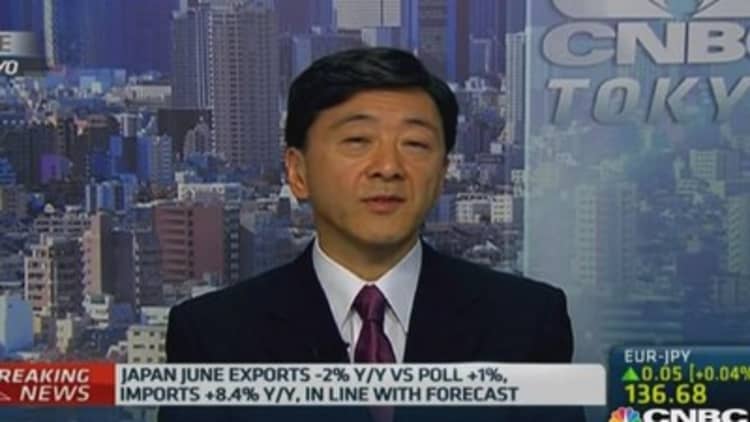
Japan's monthly streak of trade deficits hit a two-year mark in June, as exports continued to stay weak while imports remained high.
The world's third largest economy logged a deficit of 822.2 billion yen ($8.1 billion), data showed on Thursday, much wider than the 642.9 billion yen deficit a Reuters poll had forecast.
Exports unexpectedly fell 2 percent from the year-ago period, compared to a Reuters forecast for a 1 percent increase and following a 2.7 percent fall in May.
Read MoreWhat happened to Japan's yen-driven export boom?
Imports rose an annual 8.4 percent, in line with expectations and after dipping 3.6 percent on-year in May.
"The main reason for the sluggish export growth is due to the sluggish economic growth," Atsushi Nakajima, Chairman of the Research Institute of Economy, Trade and Industry, told CNBC.
"However on the other side, trade deficit is mainly due to high import volumes which are caused by the weak yen and growing import volume in energy sector," he added.
Read MoreFund managers set their sights on unloved Japan
Japan's stubborn run of trade deficits comes even as the yen has declined some 30 percent against the dollar from late 2012, when Japan's Prime Minister Shinzo Abe came to power and unleashed radical policies aimed at bolstering the economy and weakening the currency as a result.
The softening yen has failed to boost export volumes, which peaked in 2007 and fell for a third year running in 2013.
Read More Can Sweden avert 'Nordic Japan' fate?
"The exports remain one of the engines [of Japan's economy] but sluggish exports is due to hollowing out of manufacturing industry. That is not to be solved in the short term; it takes a long time. It is to be resolved by economic reform and higher investment from corporate side into software and R&D so as to enhance the competitiveness of the manufacturing sector but it takes a long time," Nakajima noted.

